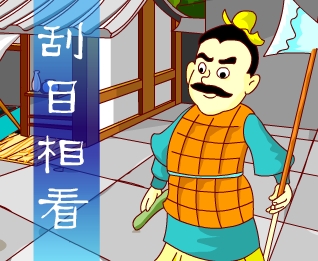
Lü Meng was a general of the state of Wu during the Three Kingdoms Period (220-180). Born in a poor family, he did not have the chance to go to school when he was a child. When he was grown, he joined the army, and there was even less time for reading.
Once, the king of Wu summoned Lü and said to him, "You're a big general now. You'd better read some books to widen your horizons."
"I am so busy with military work," Lü replied. "I'm afraid I have little time to read."
"Are you busier than I am?" the king said. "Even I find time to read books on the art of war, and they've benefited me greatly. Read more about the experience of our predecessors. You'll make greater progress."
Accepting the king's advice, Lü set about reading history and military writings. One day, chief commander Lu Su visited Lü Meng. Lu Su had looked down on Lü Meng in the past. He was surprised to find Lü had become so knowledgeable.
"I thought you only knew how to fight!" Lu Su said. "You are not the Lü Meng you used to be."
"You should always look at a person with fresh eyes – even if you've only been apart three days," Lü Meng replied.
Lü Meng's remarks inspired the idiom "guā mù xiāng kàn", or "guā mù xiāng dài". It's used to express astonishment by others' fabulous progress or improvement and increased respect for him or her.
guā mù xiāng kàn
刮目相看
?????? 三國時期(220-280),吳國有一個叫呂蒙的將軍。呂蒙出生在窮苦人家,小時候沒有機會上學。長大后,他參了軍,看書的時間更少了。
?????? 一次,吳國的皇帝召見呂蒙,對他說:“現(xiàn)在你是大將軍了,應該多看看書開闊眼界。”
?????? 呂蒙回答道:“軍中的事務這么忙,我恐怕沒有時間讀書。”
?????? 吳國的皇帝說:“你難道比我還忙嗎?我常常抽空閱讀兵書,從中得到了不少好處。多看看前人的經驗之談,你會有更大的進步。”
?????? 呂蒙接受了皇帝的建議,從此開始專心閱讀,看了很多歷史和軍事書籍。一天,主帥魯肅來拜訪呂蒙,驚訝地發(fā)現(xiàn)呂蒙變得很有學問。曾經非常輕視呂蒙的魯肅說:“我以為你只會打仗,沒想到你這么博學。你已經不是過去的那個呂蒙了!”
?????? 呂蒙回答道:“即使你和別人只分開了三天,三天后再遇到他時,也不能用三天前的老眼光來看待他。”
?????? 我們從呂蒙的話中得到了成語“刮目相看”,也叫“刮目相待”,用它來形容別人有了很大的進步,要用新的眼光來看待。
dà zhì ruò yú
大智若愚
a man of great wisdom often appears slow-witted